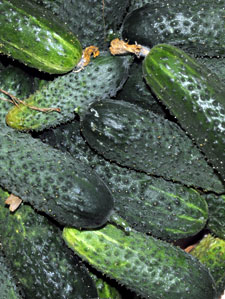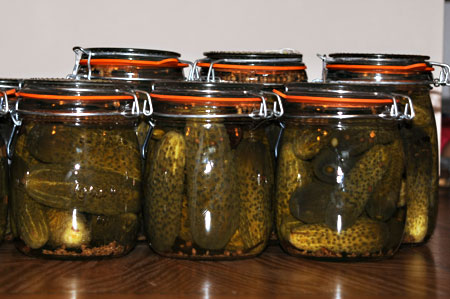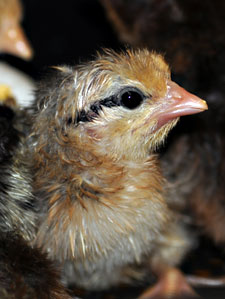Welcome to Relaxed Farming
- Alpacas
- Chickens
- Dairy Goats
- Ducks
- Geese
- Pigs
- Pygmy Goats
- Quail
- Rabbits
- Sheep
- Turkeys
- Polytunnel
- Photo Stories
- Video Stories
- Food
- Smallholding Map
- 2013
- 2014


- August
- September
- October
- November
- December
- January
- February
- March
- April
- May
- June
- July
- August


- 1
- 2
- 3
- 4
- 5
- 6
- 7
- 8
- 9
- 10
- 11
- 12
- 13
- 14
- 15
- 16
- 17
- 18
- 19
- 20
- 21
- 22
- 23
- 24
- 25
- 26
- 27
- 28
- 29
- 30
- 31
Sunday, 18th August 2013
Growing fruit and vegetables can result in a glut - too many all at once. Some vegetables are okay to leave growing in the soil or on the plant until you need them (within reason): potatoes, courgettes and sprouts are good examples. Others are best picked straight away otherwise they may become bitter or stringy, too soft or too hard: runner beans are a classic example.
A popular way to use up your excess is to pickle them and so today we picked over 80 cucumbers which in a few weeks' time will have been magically transformed into 'gherkins' with the aid of water, salt, vinegar and spices! Not one of Jack's favourite foods but David loves them!! Pickling vegetables used to be one of the few ways to keep veg and stop it simply rotting away: this was of course in the time before there were fridges and freezers. By pickling and preserving in this way, it meant that people still had vegetables to eat throughout the autumn and winter. Fridges and freezers did not become 'common' in this country till the end of World War II (ish) and after that, storing food became a whole lot easier!!
Meanwhile back in the incubators, yesterday and today we have had the Oxford English Game (pictured) and Maran chicks hatching plus some Bobwhite quail. With the chickens, we now have the delights of introducing them to their broody mums. More on this tomorrow...


